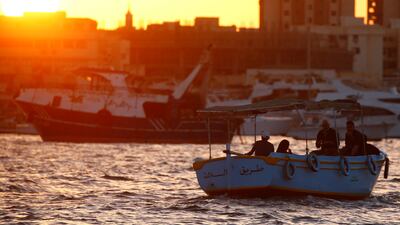The Middle East is one of the regions set to feel the effects of climate change the earliest and the most severely. This year is evidence enough.
A new report says that the situation is so critical that parts of the region should be prioritised in global environmental efforts. According to the latest Ecological Threat Report from the Institute for Economics and Peace, 768 million people are at risk from catastrophic ecological threats globally. More than 40 million of them are in the Middle East, which is particularly vulnerable to drought and climate change.
The authors marshal a lot of evidence from across the region, but the organisation's chief executive Steve Killelea drew particular attention to Iraq, Syria and Lebanon: "Some parts of the Middle East have fast rising populations, then there are conflict issues in Iraq and Syria. A lot of these issues are interrelated; you have ecological threats such as water issues, lack of food, combined with weak governance in Iraq and Lebanon and these all form background issues for civil unrest. From that we get a large level of immigration." Mr Killelea goes on to recommend that: “There is a need to prioritise these countries and improve security in the region and address the issues systemically.”
His case is strong. In 2022, drought in both Syria and Iraq has led to serious public health crises. On Tuesday, the UN said it had recorded 68 deaths from cholera in Syria and more than 800 cases. Earlier in the year, a similar outbreak happened in Iraq. People tapping into contaminated wells due to a shortage of drinking water is thought to be a key reason behind the re-emergence of the illness.
Another health consequence of drought is dust storms. Earlier in the year both countries were cloaked by thick, orange clouds that took a toll on the respiratory systems of anyone unfortunate enough to be in the vast area the storms covered. In Lebanon, weak governance endangers lungs, too. Amid erratic electricity supplies, more and more people are relying on highly polluting private generators.
Barely a day goes by without a similar story from the region emerging. And yet there is now new evidence that people care less and less. Another worrying climate report issued this week found that concerns about climate change decreased around the world last year. Fewer than half said they believed that it posed a “very serious threat” to their countries in the next 20 years.
Remarkably, the Gallup World Risk Poll found that regions most exposed to environmental dangers are on average the least concerned about climate change. Fewer than 30 per cent of those surveyed in Mena were concerned about the risks.
The region does face many other crises, which the survey cited as a possible reason for the drop in priority given to climate change. But however worrying food insecurity, the energy crisis and the Covid-19 recovery might be, it must be remembered that few issues affect as many key areas as climate change. Without tackling it soon, the world can expect more crop failures, dust storms and possibly even pandemics.
Keeping sight of the importance of climate goals will be tougher as the economic situation worsens globally. That is not to say that many governments and people in the region are not trying. Cop27 will be held in Egypt this year, and Cop28 in the UAE a year later. Across the region, countries have made tough net-zero commitments.
However much they help, governments alone will not solve the crisis. Personal responsibility is also necessary, which is why it is so worrying to see how many people do not appear to care enough to act, even as too many parts of the region burn, choke and starve.












